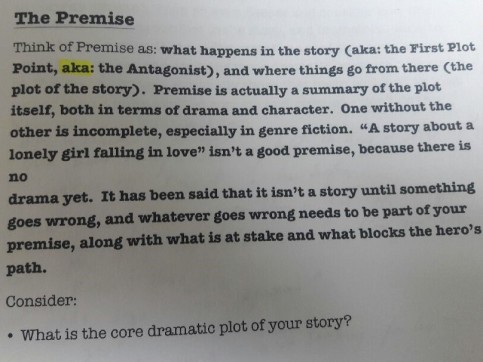storyfix
Staying Grounded in Basic Storytelling Principles
This last year I’ve really gone ‘dark’ as they say, which means I’ve been very quiet (and unproductive) on all fronts. It’s been a good break, a needed break so I could recharge and take care of myself, but now it’s time to get back to work.
When I’m struggling with a section in my WIP (work in progress for you non-industry folks), or trying to re-wrap my mind around my story I return to basic tools for guides out of that self-imposed darkness.
Larry Brooks, who if you don’t know him yet, you should – who writes writerly-how-to books is one of the gurus (via  his books and blog at Storyfix.com) that I return to over and over again. Not because I’m that stupid (well, not always) but because stories, characters, plots, themes and all the magic elixirs that make up a story world, are fluid, changing, often morphing into something completely different from what I thought I started out to write. So back to the basics I go. If I don’t go back to those grounding basics of storytelling; premise, concept, plot, theme and so on, then I get lost in the words. SO MANY WORDS! And when I get lost in the words it takes FOREVER to finish a project, be it novel, short story or essay.
his books and blog at Storyfix.com) that I return to over and over again. Not because I’m that stupid (well, not always) but because stories, characters, plots, themes and all the magic elixirs that make up a story world, are fluid, changing, often morphing into something completely different from what I thought I started out to write. So back to the basics I go. If I don’t go back to those grounding basics of storytelling; premise, concept, plot, theme and so on, then I get lost in the words. SO MANY WORDS! And when I get lost in the words it takes FOREVER to finish a project, be it novel, short story or essay.
Oh, and when I said my story could ‘often morph into something completely different’ I meant it. I recently had a conversation with Hollywood script guru, Michael Hague (author of too many books to mention here) who asked me which aspect of my story fascinated me the most, because, he said, that’s where your passion lies and that’s what you should follow. My answer shocked the baggeebies out of me. So, with that answer, which I wont’ share here…maybe later in another post – changed my entire story. After the initial shock, I was happy our conversation happened when I was only 150 pages in.
When a local writer friend, Pam Carter (Writer, Producer and Playwright) asked me about premise,

I realized during our conversation about hers that I actually needed to re-consider my original premise now that the story had changed so dramatically, and so revisited all my information on premise and concept. Again, back to Larry Brooks
who teaches this stuff like hell fire and damnation from a preacher ablaze with the truth. If you’ve seen him live you know exactly what I’m talking about.
So while I press through; re-entering my story world, getting back into a writing groove, editing, re-outlining and all the other blue-collar work a writer does to create a story-world and narrative that will be of interest to readers, I wonder, what tools do other writers return to time after time, and why? Okay, back to work.
This entry was posted in Fiction Writing, write to heal, survivor and tagged author, editing, Larry Brooks, michael hague, novel, screenwriting, storyfix, writing.
